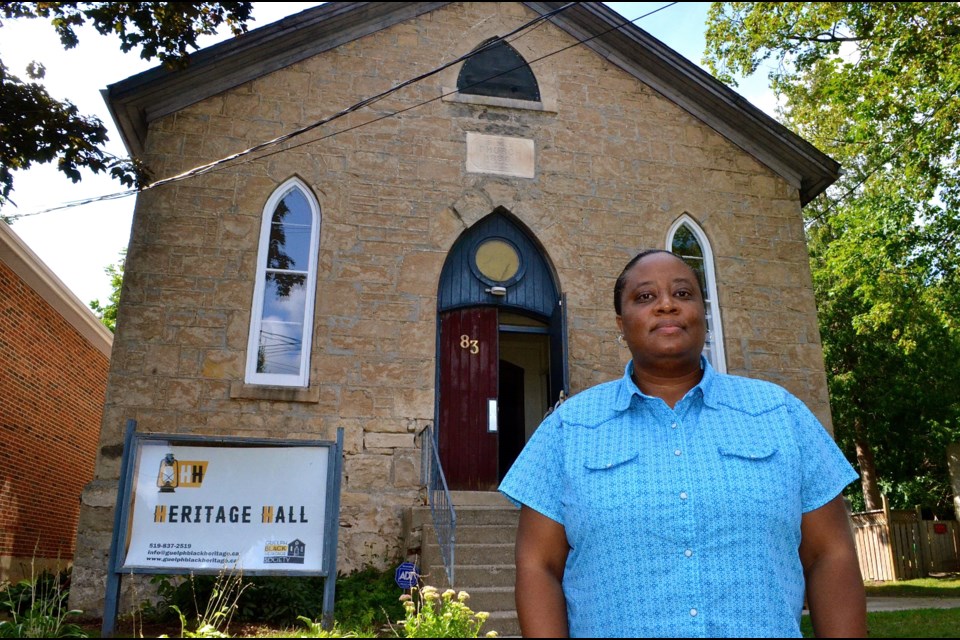The ongoing renovation and restoration of Heritage Hall on Essex Street has led to revelations about Guelph’s black heritage that were, until recently, largely unknown even to members of the black community.
“I grew up in Guelph and I only heard about this building when I was on campus at the University of Guelph and it was from somebody else who had been here and told me about it,” said Denise Francis, president and treasurer of the Guelph Black Heritage Society. “I came one Saturday and was just looking around and so I have had that connection to this building since the 90s.”
The Guelph Black Heritage Society was formed in 2011 shortly after the BME Church at 83 Essex St was listed for sale. The stated goal of GBHS was to purchase and preserve the historical significance of the church.
The stone British Methodist Episcopal Church was built in 1880 to serve the growing black population in Guelph. Many from the congregation were fugitive slaves from the United States.
“They had something called the AME, the American Methodist Episcopalian Church and when they came to Canada that’s when they became the BME Church,” said Francis. “Historically it was members of the black community often people who came to Canada via the Underground Railroad and they formed these congregations.”
Records show that the congregation was gathering on the property as early as 1870.
“Prior to this structure being here there was actually a wooden structure on this lot,” said Francis. “The wooden structure was here for 10 years prior to this stone building being built.”
The GBHS bought the church in December 2012 and renamed it Heritage Hall. When GuelphToday visited in July of last year the GBHS had just received $19,250 from the Canadian Cultural Spaces Fund and $15,000 from the Guelph Community Foundation for their Theatre Project.
“We’ve got some new AV equipment, new chairs and a new stage,” said Francis. “The shutters came from that money as well.”
The new stage and AV equipment have allowed the GBHS to improve the production value of their educational and social events and to attract others to use the hall for concerts, religious services, plays, recording sessions, video shoots and movie nights.
“It has really helped us turn this into a more versatile space and more attractive to people who want to use our building,” said Francis.
With the help of three new grants they plan to build an addition on the back of the hall that will include a wheelchair ramp.
“This year we received grants from the Ontario Trillium Foundation, the Enabling Accessibility Fund and from Canadian Heritage and the funds from those three grants will enable us to start what we call our Freedom Project,” said Francis. “The new addition will be about 500 square feet and will include a stairwell, a vestibule, a washroom and an exterior ramp.”
The goal of the Freedom Project and future renovation work is to modernize the building to make it more energy efficient and improve accessibility while preserving as much of the heritage features as possible.
“These are the original doors and we are trying to determine if they can be repaired,” said Francis. “We still have some of the original glass in the windows. The glass at the top that appears wavy is original glass from the 1880s.”
Other features have been lost to history.
“One of the things that is disappointing is that there aren’t too many pictures,” said Francis. “There used to be a manse in the back that the preacher used to live in. Local historian Jerry Prager found one picture of the manse.”
They have plans to construct a remembrance garden on the property where people can come and reflect about the community that lived and worshipped there 150 years ago.
They are also making plans for 2020 to celebrate the 150th anniversary of the BME Church in Guelph
“Natasha Henry from the Ontario Black History Society is doing some research for us so that we have a little booklet about local black history,” said Francis. “We are having our normal series of events in Black History Month and we will have our big emancipation jamboree that occurs on the last Saturday of July. It will be a party atmosphere, with music and things for kids.”
The building has yet to reveal all its history but Francis and other members of the GBHS are happy that it is becoming a popular centre for modern educational and cultural events.
“I consider my work with the GBHS a passion project,” said Francis. “Guelph and Wellington have such a rich history and there is so much we didn’t learn in school. It is our goal as the Guelph Black Heritage Society to share our history with everybody because it’s not just black history. It’s Canadian history.”

